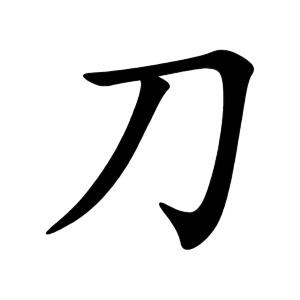刀
- sword, knife, sharp-edged tool;
Additional notes
There are other Chinese characters meaning "sword" or "blade," such as 劍 (검, geom). Generally, it's said that 刀 refers to a single-edged blade (like a saber or knife), while 劍 refers to a double-edged sword.
This distinction is clearly explained in the book "Yungwon Pilbi (융원필비)," compiled and published by Park Jong-gyeong (박종경) in 1813.
Originally, a sword with a scabbard was called “geom” (劍), while a blade without a scabbard was called “do” (刀).
Over time, however, even swords with scabbards began to be referred to as “do”, and by the time Yungwon Pilbi was published, the term “do” was widely used for both types.
Alternative forms
Characters with 刀
5 strokes
6 strokes
7 strokes
8 strokes
9 strokes
12 strokes
14 strokes
16 strokes
刀
칼
도
kal
do
Kangxi radical:18
Strokes:2
Unicode:U+2F11/U+5200
Cangjie input:
- 尸竹 (SH)
Composition:
- ⿹𠃌丿
